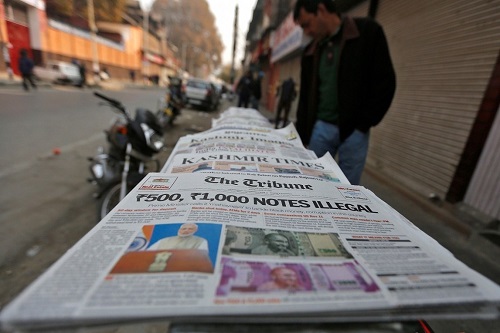Reuters photo
By
Tom Arms
The problem of so-called “Fake News” is not confined to American shores. Last week it reared its head in India, which has one of the most vibrant media industries in the world.
The government response to the perceived threat was an order to strip individuals and organisations of their accreditation if they received a complaint of “Fake News” against them. The response of the media and the public was a deafening roar of protest and the order was rescinded two days later.
There were several problems with the order that highlights the problems of regulating the press in a democratic country. First and foremost: Who decides what is Fake News? Is it simply the public at large who will have a range of differing opinions on every story printed or broadcast? Are the public’s views filtered through a panel? If so, who sits on the panel because they will wield an extraordinary power?
The efforts to introduce censorship in India is especially troubling when viewed in the context of the latest effort among power leaders of Asian democracies to target the free press under the guise of combating “Fake News.” Malaysia’s Upper House last week passed a bill criminalising the spread of “Fake News”. Cambodia and Myanmar have plans to do the same.
My industry (the media) is guilty of many sins including distortion, misinformation and – let’s be honest – at times, Fake News in pursuit of a media outlet’s political or business agenda. But it also performs a vital role in exposing corruption, lies and deceit. It holds government and big businesses to account and the fact that they do so has proven beyond a shadow of a doubt that government and business need to be constantly monitored. The alternative of a free press is more corruption.
Tom Arms
I am a journalist, entrepreneur and historian with extensive experience in print, web and broadcast journalism. I started as a diplomatic correspondent, wrote several books (The Falklands Crisis, World Elections On File and the Encyclopedia of the Cold War), and then in 1987 started my own business (Future Events News Service, www.fensinformation.com) which over 25 years established itself as the world and UK media’s diary. Our strapline was: “We set the world’s news agenda.” I sold FENS in December 2012 but retained the exclusive broadcast rights to all of FENS data. To exploit these rights I set up LookAhead TV which produces unique programmes which “Broadcasts Tomorrow Today” so that viewers can “Plan to Participate.” LookAhead has appeared regularly on Vox Africa, Radio Tatras International, The Conversation and Voice of Africa Radio.
In addition to being a syndicated broadcaster and columnist on global affairs, Tom is also available for speaking engagements and can be contacted on Twitter, Linkedin and email: [email protected].



No Comments Yet!
You can be first to comment this post!